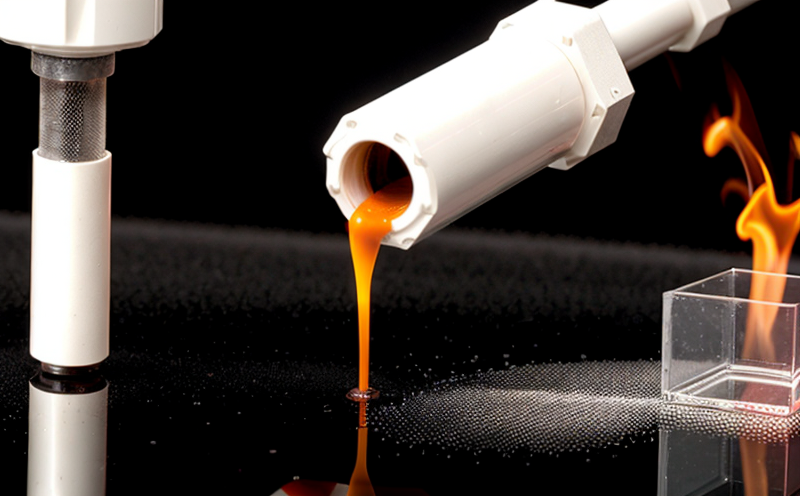ISO 10993 17 Toxicological Risk Assessment of Degradation Products
The ISO 10993-17 standard is pivotal for evaluating the toxicity and biocompatibility of materials used in medical devices, particularly those that undergo degradation or release of degradation products during their intended use. This standard ensures that any potential exposure to these degradation products does not pose a risk to human health.
The process involves a series of tests designed to assess the toxicological profile of the degradation products under specified conditions. Degradation is simulated through various stressors such as temperature, humidity, and time, reflecting real-world usage scenarios. Specimens are subjected to these conditions, and subsequent analysis determines whether the degradation products present any adverse effects.
The testing protocol requires a comprehensive approach that includes:
- Identification of potential degradation pathways
- Determination of expected degradation products under specified conditions
- Exposure of test specimens to these conditions over defined periods
- Analysis and quantification of the degradation products released into the environment or system
- Evaluation of the toxicity profile using in vitro, in vivo, and/or ex vivo methods
The acceptance criteria for this testing are stringent, aligning with the principles outlined in ISO 10993-1. The goal is to ensure that no degradation product exceeds safe limits as defined by regulatory authorities.
Our laboratory adheres strictly to these guidelines and uses state-of-the-art equipment to conduct thorough analyses of the degradation products. We employ advanced techniques such as high-performance liquid chromatography (HPLC), mass spectrometry, and spectroscopy to identify and quantify even trace amounts of potentially harmful substances.
The results are meticulously documented in a report that includes detailed information on the testing methodology, findings, and conclusions regarding biocompatibility. This documentation is essential for regulatory submissions and ensures compliance with international standards.
| Application Area | Description |
|---|---|
| Medical Device Manufacturing | Evaluating the biocompatibility of materials used in medical devices, especially those that degrade over time. |
| Biomedical Engineering | Assessing the potential toxicity and degradation products in biomedical implants and prosthetics. |
| Pharmaceutical Manufacturing | Ensuring the safety of drug delivery systems and devices that release active pharmaceutical ingredients over time. |
| Toxicology Research | Providing data for research on the toxicological effects of degradation products in various biomedical contexts. |
In summary, ISO 10993-17 testing is crucial for ensuring that medical devices and related technologies do not pose a risk to patients due to exposure to harmful degradation products. Our laboratory provides this service with precision and reliability, adhering strictly to the guidelines set forth by international standards.
Benefits
- Enhanced Patient Safety: Ensures that medical devices do not release harmful degradation products into the body.
- Regulatory Compliance: Meets stringent regulatory requirements, simplifying compliance efforts for manufacturers and researchers.
- Risk Management: Identifies potential risks early in the product development lifecycle, allowing for necessary adjustments to be made before market launch.
- Informed Decision-Making: Provides clear data on the biocompatibility of materials used in medical devices, aiding in informed design decisions.
- Reputation Enhancement: Demonstrates a commitment to quality and safety, enhancing the reputation of manufacturers and researchers.
By leveraging our expertise in ISO 10993-17 testing, you can ensure that your products meet the highest standards of biocompatibility and safety. This service is essential for maintaining trust with regulatory bodies and ensuring a successful product launch.
Industry Applications
The ISO 10993-17 standard has broad applications across various industries, particularly in sectors dealing with medical devices that undergo degradation over time. Here are some key industry applications:
- Medical Device Manufacturing: This includes the evaluation of materials used in pacemakers, implantable sensors, and other devices where long-term biocompatibility is crucial.
- Biomedical Engineering: Used to assess the safety of implants such as orthopedic prosthetics and cardiovascular stents.
- Pharmaceutical Manufacturing: Essential for ensuring that drug delivery systems, like transdermal patches or implantable drug reservoirs, do not release harmful degradation products into the body.
- Toxicology Research: Provides valuable data on the toxicological effects of degradation products in various biomedical contexts.
Our laboratory specializes in providing this service to these industries, ensuring that they can meet rigorous standards and maintain a high level of safety for their products.
Eurolab Advantages
- Comprehensive Expertise: Our team consists of highly skilled professionals with extensive experience in nanomaterials testing and toxicological risk assessment.
- State-of-the-Art Facilities: Equipped with advanced instrumentation to conduct precise and accurate analyses, ensuring reliable results.
- Regulatory Compliance: Adhering strictly to international standards such as ISO 10993-17 ensures that our services meet the highest regulatory requirements.
- Prompt Reporting: Our efficient reporting process allows for timely submission of results, critical for product development timelines.
- Confidentiality and Security: We maintain strict confidentiality protocols to protect sensitive data and intellectual property.
- Custom Solutions: Tailored testing plans that address the specific needs of our clients, ensuring comprehensive coverage.
At Eurolab, we pride ourselves on providing a robust service that not only meets but exceeds industry expectations. Our commitment to excellence and client satisfaction is unmatched.





